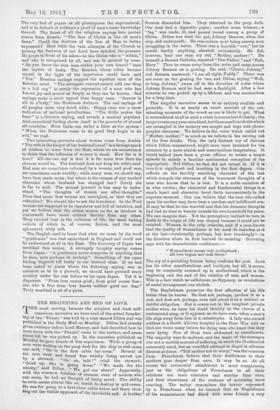THE GOADS OF THE. WISE.
SIX little books have lately been published by Messrs. C. W. Daniel called " Stories and Sayings from Many Lands." The series forms an anthology of folk-lore stories and proverbs put together by Isabel Fyvie Mayo (1s. each). " The little books are not intended for the edification of the learned," but to "awaken in the many" "international and inter-racial sympathy." How far the anthology is repre- sentative is a question which must be begged by all but those for whom it is not written. Europe, Asia, and even Africa contribute to its pages. The public for whom it is intended will find in it excellent reading very well arranged. Simple people are not seldom silly—by simple we mean unlearned. Only the sentimental will, we think, deny this axiom. The great object of education is to give judgment to protect men, that is, so far as they can be protected, against silliness. On the other hand the wisdom of the simple when they have wisdom is pregnant in the extreme and fearfully realistic. Of sentiment they know nothing. " Take the cotton out of thine ear and distribute justice to mankind," says the Persian poor man to his rulers. The poor are all brought up amongst bare truths, and the ablest amongst them deduce from their experience a common sense which in its independence of logic and in the universality of its appeal appears to be almost inspired. "God and poverty make us wise," says a Servirtn proverb. A little further east—in Russia—we hear: "Love and Hunger are the foundation-stones of all things." Extremes meet. There are those, but they are not among the poor, we think, who pride themselves on their freedom from sentimentality, who should pride themselves only on their power of rendering themselves deaf. Whoever cannot hear the cries of the suffering is congenitally incapable of realism.
Thinking of poverty and its effect on wisdom, among German proverbs we find one very much in the same sense as that quoted above: "Poverty is a sixth sense." Un- fortunately that sixth sense too often enables a man to per- ceive his own interest alone. From Ceylon comes a saying which seems to carry out our suggestion. " The poverty of the poor shall end when they regard the wants of each other." No one in Ceylon or anywhere else can doubt, we suppose, that the poor are often remarkably kind to each other. They, however, seldom act in combination. Did the wise man who first said this believe that poverty could be destroyed by the corporate action of the poor in their own supposed and distinct interest P Had he lived now he might have doubted his own conclusion—or at any rate modified it. It is natural that the mass should see the faults of the fortunate few. " They must be strong legs that can support prosperous days," says the German peasant. To us it seems as though poverty were the heavier moral burden. Probably the prosperous have no idea how absurd and how blameworthy they often look from below. After all, the lucky are in no need of praise. They have many more solid advantages. Luck and ill-luck take great proportions in the minds of the poor. It is a natural view among those who cannot afford artificial safeguards, who walk the tight rope of life with no nets below. " He who is born to misfortune falls on his back and fractures his nose," says a misanthropic humorist. Fatalism, however, seems to play a very small part in the wisdom of the West, and the necessity for hard work and for initiative is continually emphasized. "God gives the milk, but not the pail," is typical of many sayings of the people.
Religion is, of course, the chief abstract interest of the poor— of those, we mean, whose wisdom comes from God and poverty, —and the religous proverbs here quoted are full of faith and emotion. " Whatever a man prays for, he prays for a miracle" say the Russians. How extraordinary that hand- workers with no conscious knowledge of nature and her new- found uniformity should. have said this. The wisdom of the simple is more fundamental than that which study can produce. The very fact of prayer at all presupposes the supernatural, and is in default of evidence a proof of man's inner knowledge thereof. The finest of all the religious sayings here quoted comes from Russia : " The face of Christ is like all men's faces." Could the doctrine of the Son of Man be better expressed P How little the vain attempts of the Church to portray the features of our Lord have deluded the peasant. He prays in front of his eikon—to the Christ who is " within," and who is recognized by all, and can be painted by none. " Do you know the wise man within your own heart P " says the mystic of India. The Russian whose eikon became unreal in the light of his experience could have said " Yes." Russian sayings suggest the mystical turn of the Russian mind, "The strongest current cannot add one drop to a full cup" is surely the expression of a man who has known joy and sorrow as deeply as they can be known. Sad sayings make a surer appeal than happy ones. " Sorrow is sib to a'body," the Scotsman declares. The sad sayings of all peoples seem very much alike. Happy ones are a surer indication of national peculiarities. "The fiddle makes the feast" is a German saying, and reveals a musical populace Anti-sacerdotal feeling !shows itself in the proverbs of almost all countries. Even India can strike a blow at the system " When the Brahmins cease to do good they begin to do evil," we read.
Two interesting proverbs about women come from Arabia "The wife is the keeper of her husband's soul" is a strange spark of wisdom to come from the East, where we are accustomed to think that the influence of women is small. How far is it true P All one can say is that it is far more true than the obverse would be. The husband does not keep his wife's soul. Bad men are sometimes reformed by a woman, and good men are sometimes made worldly ; while many men, we should say, have been made mean ; but where is the woman of any marked character whose husband has changed her P Surely she is far to sock. The second proverb is less easy to under- stand. " The thoughts of women are after-thoughts." Does that mean that women are unoriginal, or that they are reflective P We should like to ask the translator. In the West women are supposed to be impulsive and full of intuition, and yet we believe that the ablest women (so far as intellect is concerned) have more critical faculty than any other. They succeed best in the criticism of life, the most lasting vehicle of which is, of course, fiction, and the most ephemeral, witty talk.
The English used to boast that what we mean by the word " gentleman" was best understood in England and could not be understood at all in the East. The discovery of Japan has modified this notion. A strangely haughty saying comes from Japan "A gentleman never competes in anything that he does, save perhaps in archery." Something of the same feeling lingered till lately in our leisured class. If we had been asked to guess where the following saying was so common as to be a proverb, wo should have guessed every country under the sun before we hit upon Japan. Yet it is Japanese. " From love comes grief ; from grief comes fear ; one who is free from love knows neither grief nor fear." Truly mankind is all of a piece.











































 Previous page
Previous page